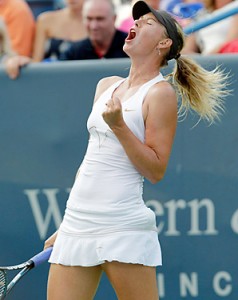When Maria Sharapova won the Western & Southern Open in Cincinnati against Jelena Jankovic on August 21, I breathed a sigh of relief—not because I particularly love Maria Sharapova, but I prefer her aggressive playing style in comparison to Jankovic’s mostly-defensive game. At one point, when Sharapova was down a set and serving in the second at 5-6 and 30-love, the screen flashed a shot statistic—Jankovic’s 9 winners to Sharapova’s 26. Sharapova won the set, albeit with 10 more unforced errors than Jankovic.
 Both players have solid groundstrokes, but the most exciting points of the match were Sharapova’s winners, when she hit her absolute hardest, ending a routine, ho-hum rally with one massive swing (and shriek)—her opponent’s racquet clanging to the ground as it reached for the ball, head dropping in defeat, Sharapova pumping her fists on the other side of the net. Those are the kinds of points you watch tennis for. Those are the kinds of points you see so much more in the men’s game than the women’s.
Both players have solid groundstrokes, but the most exciting points of the match were Sharapova’s winners, when she hit her absolute hardest, ending a routine, ho-hum rally with one massive swing (and shriek)—her opponent’s racquet clanging to the ground as it reached for the ball, head dropping in defeat, Sharapova pumping her fists on the other side of the net. Those are the kinds of points you watch tennis for. Those are the kinds of points you see so much more in the men’s game than the women’s.
Watching a defense-based match sucks, which is why I’m not enthused about Caroline Wozniacki’s #1 world ranking. The 21-year-old is often criticized for being a “moonball” player—standing behind the baseline and casually hitting balls back over the net, waiting for her opponent to flounder. She’s also never won a Grand Slam—something that has caused many fans to question the sport’s rankings system.
Maybe they’re onto something. Prior to Wozniacki, the most recent additions to the world #1 club were Dinara Safina and Jelena Jankovic—both unremarkable players, both also Slam-less. Ana Ivanovic, the newest world #1 before that, won one Grand Slam before slipping out of the top 20 by the end of the following year.
In Wozniacki’s defense, she tries—her ranking has everything to do with the amount of tournaments she plays. She at least played through Cincinnati until she lost (one match total). Serena Williams crushed her first-round opponent, then promptly pulled out with a toe injury (and was later seen on a roller coaster and then attended Kim Kardashian’s wedding); Venus Williams had a virus; Victoria Azarenka hurt her hand; Kim Clijsters had a stomach injury.
 The fading quality of women’s tennis is only magnified by the increasing excitement on the men’s side. For one, the men seem to play with a higher level of athleticism and much more consistently. You don’t have to worry that you’ll end up watching an error-prone match that’s lost rather than won—something that’s relatively par for the course with the women.
The fading quality of women’s tennis is only magnified by the increasing excitement on the men’s side. For one, the men seem to play with a higher level of athleticism and much more consistently. You don’t have to worry that you’ll end up watching an error-prone match that’s lost rather than won—something that’s relatively par for the course with the women.
The men also have better stories—Roger Federer’s legacy, possibly leaving the sport as The Greatest of All-Time; Rafael Nadal’s clay dominance turning into all-surface dominance, and his role as Federer-kryptonite; and now Novak Djokovic, who’s evolved over the years from a whiny, easily winded, bottom-of-the-top player to a fiercely talented new world #1, breaking up the Federer/Nadal rivalry. And let’s not forget poor Andy Murray, whipping boy of the British press every time Wimbledon rolls around each year. Even Mardy Fish, with his recent victory over Nadal in Cincinnati, has added new drama to the men’s top tier.
The women’s game has the second rise of Sharapova (though she hasn’t won a Slam this year), and Serena Williams looks to be climbing the rankings again (though her earlier-than-expected loss at Wimbledon was kind of a downer). Petra Kvitova and Li Na, winners of this year’s Wimbledon and French Open, respectively, have brought back a bit of life to women’s tennis—but until they prove themselves not to be one-Slam wonders, most fans probably still won’t know who they are.
As the U.S. Open gets underway today in Flushing, hopefully the women’s final doesn’t end up like last year, when Kim Clijsters steamrolled Vera Zvonareva—she’s the world #2 and also Slam-less—in under an hour: 6 -2, 6-1. (It was almost insulting to watch after the epic five-set, almost four-hour men’s semi-final between Federer and Djokovic.) So ladies, please: Bring your A-games and leave the moonballing at home. Restore some dignity to the sport you love.
